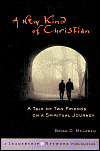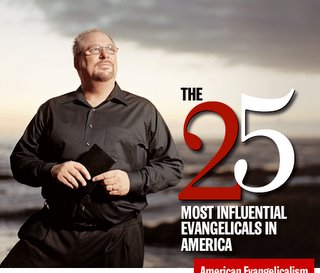Here in the Columbus, Ohio area, we have LifeWay Christian Bookstores. One of the smaller branches is located just a few miles from my home and I go there frequently. As with many bookstores, there are both good and bad materials stocked there. I cringe every time I walk past the Bible section and see the “Biblezines” there on the shelf. Turning down another isle
 makes me cringe once again as I lay eyes on “smiley boy’s” (Joel Osteen) book, “Your Best Life Now”. But I have not run across any books by Brian McLaren and other well-known postmodern authors in the smaller store.
makes me cringe once again as I lay eyes on “smiley boy’s” (Joel Osteen) book, “Your Best Life Now”. But I have not run across any books by Brian McLaren and other well-known postmodern authors in the smaller store.I do occasionally go into the LifeWay “mega store” at the north end of Columbus. That particular store stocks everything. That includes books by postmodern authors such as Doug Pagitt, Rob Bell, Brian McLaren and Leonard Sweet. Mainstream Evangelicalism is being infiltrated by the philosophy of these postmodern “thinkers”, more than anyone can imagine. Do not naively think that this postmodern thought is only limited to the “emerging” church. Just as many evangelical churches jumped on the bandwagon of the seeker-sensitive movement, they are now
 jumping on the postmodern fad exclaiming “us too!” While many may not currently be jumping in with both feet, they are nonetheless beginning to subtly adopt some of the teaching being promoted by the “emerging” crowd.
jumping on the postmodern fad exclaiming “us too!” While many may not currently be jumping in with both feet, they are nonetheless beginning to subtly adopt some of the teaching being promoted by the “emerging” crowd.In the church that I currently attend, one of the members of the pastoral staff who was serving as the youth pastor at the time, was quoting out of Brian McLaren’s book, “A New Kind of Christian” to the youth group. This was told to me by someone in the church who assists with the youth ministry. This man asked me whether or not I was familiar with the material, since he reported that much of what was quoted seemed to be doctrinally off-base. I had seen the book in a bookstore a long time ago and picked it up briefly, but quickly decided that it was not worthwhile, so I put it back on the shelf and moved on. I usually do not spend much time reading heretical material. Time is much too precious to waste on nonsense. However, since this incident in our church, I pay a little more attention to these things to at least read enough of the material to discern what is being taught. After this issue was brought to my attention, I went and did research on the book and looked over the material more closely. The material was indeed heretical and introduced ideas that countered Biblical teaching. I put together the material gathered in my research and gave it to the particular gentleman that brought it to my attention. I then sent the research off to the youth pastor with a stern warning concerning the material. Before the McLaren incident, our pastor quoted out of one of Leonard Sweet’s books and even showed a picture of the book’s cover on the overhead screen in one of the Sunday morning services. At that time I was not very familiar with Sweet’s material either. Since that time I have not heard much mention of this material being used, and certainly nothing being quoted out of works such as Brian McLaren’s.

But I can’t help but wonder how much this material has altered their reasoning and philosophy of ministry. Are they still utilizing much of the material but not making public mention of these works? Are they more secretive now because some people are more privy to what is going on? One thing that really annoys me is that there are many things that simply will probably never be preached from the pulpit for fear of offending some people. I have also noticed a subtle tendency toward a shift to a more “conversational” dialogue style of teaching. I personally refuse to lead Bible studies consisting of a sort of round table style of discussion where everyone merely expresses their view of what they think a passage means to them. This is not a case where I do not encourage discussion. But I always begin with a determination of what a certain passage means within its context, and then open up to discussion on how it applies to our lives. It really does not matter what the Bible means to me or what it means to you. What matters is what did God mean when it was written and how does it apply to our lives.
These are certainly spiritually dangerous times in which we live. We need more than ever, to be like the first century Bereans in Acts 17:11, who diligently searched Scripture to verify the truth.





